This is a fascinating time in the history of UK railways. The debate about nationalisation rages on within the Labour party, Network Rail is on the public books with serious questions being asked about its future, Borders Railway (the longest railway to open since the Great Central Railway in 1899) started carrying fare-paying passengers on September 6 (see pages 6-9), and waves of new trains are destined for our railways.
There is a lot to contend with, and Hitachi Rail Europe Managing Director Karen Boswell is excited. Having been praised for her work as Managing Director of East Coast, she left when Virgin Trains East Coast took over and has since taken her expertise to Hitachi.
And Boswell is fiercely determined that young people should get a chance in an industry she joined 15 years ago.
She meets RAIL on August 27, in Hitachi’s Holborn offices in London. That the Japanese giant has a presence in the capital is a signal of intent and a real commitment to the UK and the European markets, she believes.
It’s also exactly one week until the firm opens its Newton Aycliffe factory in the North East, only a few miles from the birthplace of the railways on the Stockton & Darlington Railway. Boswell beams a broad smile when she talks of that. A genuine excitement comes through as she discusses the factory and the opportunity it offers.
“What I need for the future going forward is to always have Newton Aycliffe full. It isn’t a perfect world - you can’t say when you’re bidding for lots of different rolling stock contracts, and this is globally, where those will fall into place. You win some, and you won’t win some.
“We’re very comfortable with the IEP contract. We’re very comfortable with the AT200. And actually, what we have is a global production view - we have the best of being able to leverage our global perspective and things like body shells, friction stern shells and bogies. There are over 30 suppliers at Newton Aycliffe that are sourcing 72% of all the parts.
“I can give you another interesting fact that came into my mind recently. When I first went up to Newton Aycliffe and looked at how that was designed and built - 95% of the team that worked on that, from architect designing to the build out, 95% of the workforce came from within a 50-mile radius. I think that’s a pretty impressive stat.
“They are all local. We’ve had over 12,000 applicants… 12,000! 730 jobs at the beginning. So there’s a lot of pride in the North East for getting that right. I know the North East well - you talk to people, you go in a cab, you go in a coffee shop, everybody knows about the plant, everybody will talk to you about making it a tremendous success. And that’s not lip service.”
It sounds as if Boswell is clearly looking forward to the opening.
“I am! What’s not to like? I think there are some really interesting things happening in the railway. I don’t think there’s any better industry to be in.
“When you think about the investment, the innovation that’s coming, and from a Hitachi perspective the innovation that we’re also bringing to the engineering side of train building. And there’s some interesting stuff out there as well as our system side of things, through TMS and signalling.
“But being in a position where we’re going to be opening up a brand new manufacturing plant, I call that a pinnacle of your career in lots of ways. I do think it’s bringing engineering back, it’s going full circle.”
Hitachi Class 395s have been in traffic since 2009, while the first IEP Class 800s have arrived in the UK for testing. Class 381s (AT200s) are due to begin arriving next year, while in 2018 AT300s will enter traffic between London and Penzance.
But Hitachi has other deals as well, including a recent traffic management system (TMS) contract for the central core through London (RAIL 780). This will enable Network Rail to operate the 24 trains per hour that form the key element of the £6 billion Thameslink project, as it triples capacity from just 8tph in 2008.
Is it this level of investment and opportunity that attracted Boswell to Hitachi?
“It wasn’t just the new factory, no,” she laughs. “I count myself as very fortunate having a second career, after running a TOC . I believe I ran one of the best TOCs in the country. I’m very proud of the result myself and my team achieved in the last five and a half years.
“I think it was a really great opportunity to get into the supply chain, because my career - you’ll know this from knowing some of my philosophies from previous roles - I’ve always been interested in the end customer perspective.
“I believe successful companies are around what fare-paying customers are interested in. And for me now, in supply chain and manufacturing and maintenance, actually making sure that I listen to my customer, and my customer’s customer. It’s really customer-focused engineering.
“I’m at that age where working for an organisation that didn’t have that fit culturally wouldn’t work - you have to know where you’re going to be able to excel at.
“So really, what I’m doing is focusing the organisation onto the delivery. My reputation in the last job for about five and a half years was delivery. It wasn’t really delivery in just one area, it wasn’t just operations or safety or customer or financial, it was across the board.
“I’m here to run a business that’s profitable, that’s successful, that will grow. What I’m bringing in now actually is that wider one-team focus on the size of the organisation, getting ourselves really really in shape for delivery and to continue to be greater, in five years.”
Boswell talks about the new train fleets. There are the 122 IEPs for Great Western from 2017 and Virgin Trains East Coast from 2018. These will replace the High Speed Trains that date from 1976, as well as the majority of Class 91/Mk 4 sets on the East Coast Main Line.
The ‘381s’ will operate on newly electrified routes in Scotland as part of the £742 million Edinburgh to Glasgow Improvement Programme (EGIP), and will enter traffic in 2017. Seventy trains have been ordered in a mix of three-car and four-car formations.
“I think that some of the innovations - whether you’re looking at the IEP fleet, the AT200, some of the concepts we’re starting to put out there for our British Bullet train - I’m very into the very, very high speed train solution as well. I think that the philosophy Hitachi has, its value system is into the long-term, getting close to its customers and understanding what customers are about to make its businesses more successful. So that’s what attracted me really.”
But not all the trains have been welcomed. Controversy has surrounded the IEP deal, with questions raised over its finances, followed by seats not lining up with windows. First Great Western staff have been on strike over the planned removal of catering facilities and the introduction of Driver Only Operation. How does Boswell, and Hitachi, deal with that?
“I think it’s an interesting question, because if we’re to take the challenge that Great Western is working with at the moment with industrial relations - that isn’t about the train, that isn’t about what we’re doing with the train, it’s not about the build. It’s about the operating matter. It’s how the organisation - a train operator - wants to structure its business.
“But in terms of views on how we’ve got to where we are in the build and specification of IEP, it’s before my time. And while I’m very well rehearsed now in all the detail - being involved in East Coast, I understand all that background - we are where we are. The contract is signed, the trains are being built, and they look great. I’ve got the contract to maintain those trains for 27½ years, and I’m damn sure I’m going to deliver that on time and to a really really great level.
“So I think the way to counter the view on that, is to do what we do and execute it really well.”
With IEP, two five-car Class 800s and one nine-car Class 800/1 are in the UK. Construction in earnest begins in the North East in February, and the trains are due in traffic in 2017. The first ‘800’ will move to North Pole depot soon, giving staff the opportunity to familiarise themselves with the new train. So how is the IEP contract progressing?
“It’s going really well. You wouldn’t really expect me to be sat here, particularly with a Hitachi pedigree, and actually say I’m behind schedule, because we’re absolutely not. We’re ahead - we’re ahead with the factory, the planning the schedule, the build, North Pole is recruiting people, we’ve got some real opportunities to see how to fill all those depots up. What I’m particularly pleased with is the enthusiasm and the passion that I’m seeing from those guys on the ground.”
Sources within Hitachi talk with great pride about the business, and a quiet awe regarding what the company is developing, and what could be achieved. Is this level of innovation something that could be seen on future orders, be it for signalling, TMS or trains?
“I’ve had a meeting this morning, talking over something similar in a very similar vein in many ways. In some ways, one of the very best kept secrets about Hitachi is the stunning level of quality in the engineering, and the innovation that it does. It’s evidenced by our reliability, by our ‘Javelin’ fleet, by the ‘Shinkansens’, the whole reputation.
“But actually when you’re inside Hitachi - I’m not an engineer, I’m not Japanese, not male for that matter, so probably break all those rules - what I do see is the work that’s going on, the quality of the engineering, the design, the innovation. And having that happening here, I’m seeing what we’re doing in terms of trying to understand for the AT200, it’s phenomenal.
“I think we have to lift the lid a little bit more on all of that and demonstrate exactly what we’re doing, because we’re an engineering organisation and a maintenance organisation. And people who are going to come into the maintenance part of our organisation, for example, the quality of engineering support is going to be absolutely brilliant.”
Newton Aycliffe is the Japanese firm’s first train manufacturing facility in the UK, and will lead from the front. But Boswell says the Hitachi depot at Ashford has also been working on innovation.
“In terms of designing product, and manufacturing product, we have a global proposition. We build trains in Japan, and now we will be building trains in the UK, and that will be supporting the European market.
“When I look at the opportunities in the UK and Europe, it’s phenomenal what could be on the horizon for new fleets coming in. And I think the quality and the pedigree of what we’re going to do is so important.”
Talk of new trains is all well and good, but is there the money for it? After all, rolling stock leasing companies (ROSCOs) are developing ways to eke out longer careers for many second-generation EMUs dating from the 1980s. And the Southeastern Network fleet was retractioned eight years ago, and has not suffered a failure in traffic. The manufacturer of the traction package? Hitachi.
“I think there are more inventive ways of financing,” Boswell replies.
Like the AT deals?
“Yeah. I’ve been up to Scotland - it’s really great. I’ve met with the Transport Minister and Transport for Scotland, Abellio, Network Rail - the enthusiasm about what’s going on up there is palpable, and a great financing deal. And that’s one of the most interesting ways. Those guys own the trains at the end of it. It’s really got into their mindsets. So I think it’s creating financial deals like that.”
But is that the way forward for the industry?
“I think that in this world there’s never just one way, is there? I think there are always different ways of approaching it, and it’s about what set of circumstances you’re in at the time. So I wouldn’t ever be as arrogant as to say ‘well actually, this is the way you have to do it. What it does show me is there are different, flexible ways of thinking about how you want to crack a particular nut.”
Regarding the AT300 deal, FGW Managing Director Mark Hopwood said that the caveat to the contract was the General Election, as Labour could have scrapped the GW franchise and train order. Was there a concern within Hitachi that the AT deal could have been put on hold?
“Until the deal’s done, it’s never done,” Boswell replies. “You can point to history on many occasions when people thought a deal was done, and then for all sorts of reasons took it off the table.”
Politically, cancelling that deal and telling the West Country they couldn’t have new trains would have been a nightmare.
Boswell acknowledges: “It would have been tricky. As an MD previously of a TOC, I wouldn’t have liked it... yeah, that’s a tough gig isn’t it? But ultimately, fortunately for all of us, that wasn’t the case.
“So actually, if you went and spoke to FirstGroup or to Eversholt, I think everyone’s tremendously impressed with how, with three parties, there was such a lot of collaboration to get that over the line.
“That’s actually another Hitachi trait - getting close to your customers. Because there will be times when things are tricky. Having supplier arrangements, being in a win-lose situation is not an option actually. You have to work out how to get win-win.”
Boswell believes that is a challenge for the rail industry itself.
“With such a complex diversity of spec holders, how to ensure that we’re win-win. I see Hitachi’s role and my role in leading this company is making sure we reinforce, so we become a solution to our customers. But for us to do that, we need to understand our customers’ customers as well, because we give them solutions that make it easier to put that in place.”
She says Hitachi has researched what markets want, and designed accordingly. There is not a situation whereby the customer has to adapt to what the train manufacturer delivers.
Boswell explains: “IEP, actually, is a really good case in point. There were so many people involved in designing that train - the driver’s cab, inside the interior, as well the external stakeholder market. I think there’s some phenomenal figure around that.”
When the first Javelins arrived in 2007, it was nearly two years before they entered traffic. And they followed the A-Train, a converted Class 310 EMU used as a testbed for the Japanese firm to monitor what was required for the UK market.
This seems to be a Hitachi practice, and has been replicated by the Class 800s arriving two years before entering traffic.
Previously, when there was talk of a new train order, the initial reaction would be that the competition would involve two bidders. Now it is three bidders, and there is sometimes surprise when Hitachi isn’t successful. That’s a long way to have come in a relatively short space of time.
Boswell nods: “Yeah, we’ve definitely come in and mixed up the market in that regard, which I think is always a positive outcome.
“If you went to Ashford right now, I’ve been hugely impressed. I’ve been spending time with the guys down at Ashford. This year they’ve put a new balanced maintenance regime in - it’s gone absolutely brilliantly. These things aren’t easy to put in place and change.
“So we’re not running the Javelin fleet in the same way that we started it on day one - we are integrating and we keep learning, we keep innovating.
“A lot of the maintenance stuff that we see built into the IEP, for example, is because we’ve talked to the guys down at Ashford. They’ve given us their views, and that’s gone into it.
“So when people say this is all Japanese, actually the guys over in Ashford have had a really big part to play in how you maintain these trains reliably. Your - our - provenance is there to see.
“When I look forward and look at the footprint of the UK, and we see the depots where we’re going to be operating and maintaining these fleets, that philosophy - taking the very best of everything we do at Ashford and translating that through our maintenance strategy through the UK - is going to be so important.”
One area Hitachi is working on is how the trains will be maintained, although there has been some resistance on the Great Western Main Line, as depots such as Old Oak Common and Laira face a vast reduction in workload when the new fleets arrive and the HSTs depart.
“I think this is our big change programme, and what we have to do - together with Great Western - is work out what the right plan is,” says Boswell.
“What you have to do if you want to bring new ideas in as well - people are human beings. Those guys at Great Western at the moment will be apprehensive. There’ll be agreement as well as other people thinking ‘Hitachi, are they a great organisation to join?’
“There’s a well-known understanding that there’s a massive skills gap in this country for engineers, and that’s an ongoing challenge for Hitachi or Great Western or Siemens. And that’s because we’ve got such great things going on with Crossrail, HS2, new fleets, and new trains coming in.
“My short answer is that you wouldn’t expect me to sit here and give you detailed plans. But actually there’s a philosophy about how you manage change effectively, and how you get the right outcome. My philosophy about people is making sure that you treat people well, because actually we need to be making sure they know the quality we’re trying to achieve as well.”
It has been suggested that should the GWML electrification programme run late, there is the potential for brand new IEPs to be sitting in sidings when they should be used. Of course, Agility Trains, which owns them, will only be paid if they are used.
“In terms of our delivery plan, we’re completely on plan. There’s no worries in my head that we will not be delivering on time,” says Boswell.
“In terms of what happens with Network Rail electrification, I think we will continue to see how that works through, and I’m interested to see what Peter Hendy’s outcome for the autumn statement’s going to be.
“But from our perspective, we’ve not been told formally of any change to the Great Western. However, if there was a change, all I would say to that is: it’s great when you have such innovation in your company that you have products that are flexible. And we have a bi-mode product.”
So you can still deliver the Great Western upgrade even if the wires aren’t there?
“Well, I’m not saying that. I’m saying we have a flexible product, so I think our agreement is to deliver to our agreement, but we have in our portfolio a buyable product. That’s not for me to determine what or when that happens, that would be for Government to specify, but that’s the sort of innovation that you want, isn’t it? At the moment you talk about innovation - I’m very excited, we’ve got a lot on testing a battery train at the moment.”
That is in Japan.
“I talk about Hitachi globally.”
She discusses Hitachi’s UK presence: “I was doing some mapping the other day, and I was looking at the depot’s structure as well. And I was thinking we were going to have an IEP train up from Penzance all the way to Inverness and Aberdeen, going all the way through, then we’ve got our AT200s up in Scotland. So it’s great.
“We do deliver on time. Not delivering on time is just not part of it. I’m a delivery person. You can’t be arrogant, you have to keep pushing and working hard at that. It just doesn’t happen, you have to make it happen.”
- This feature was published in RAIL 783 (September 16 - 29 2015)

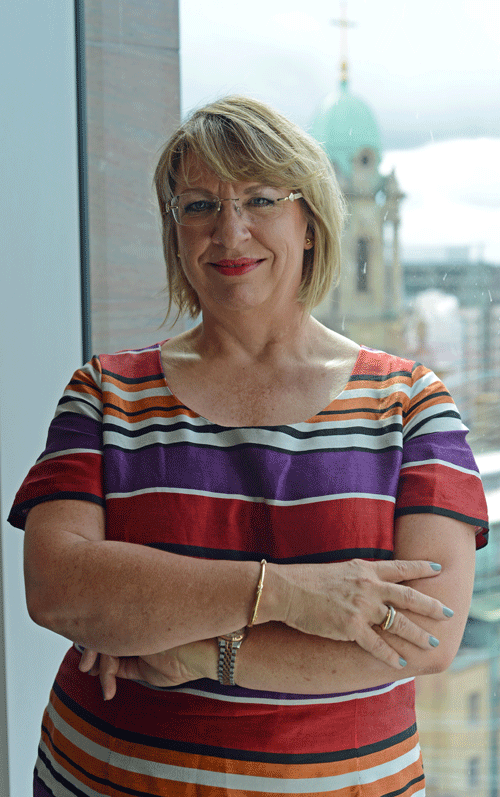
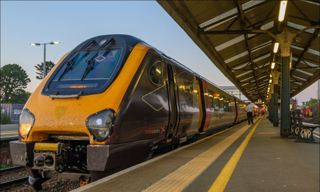
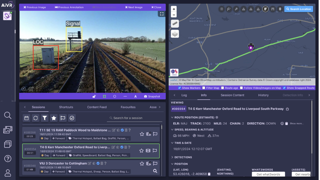
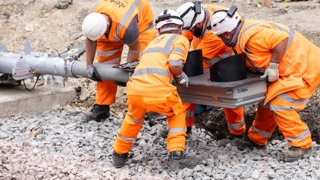
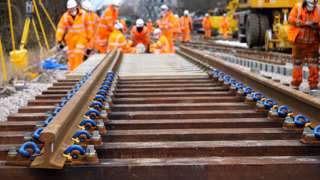










Login to comment
Comments
No comments have been made yet.